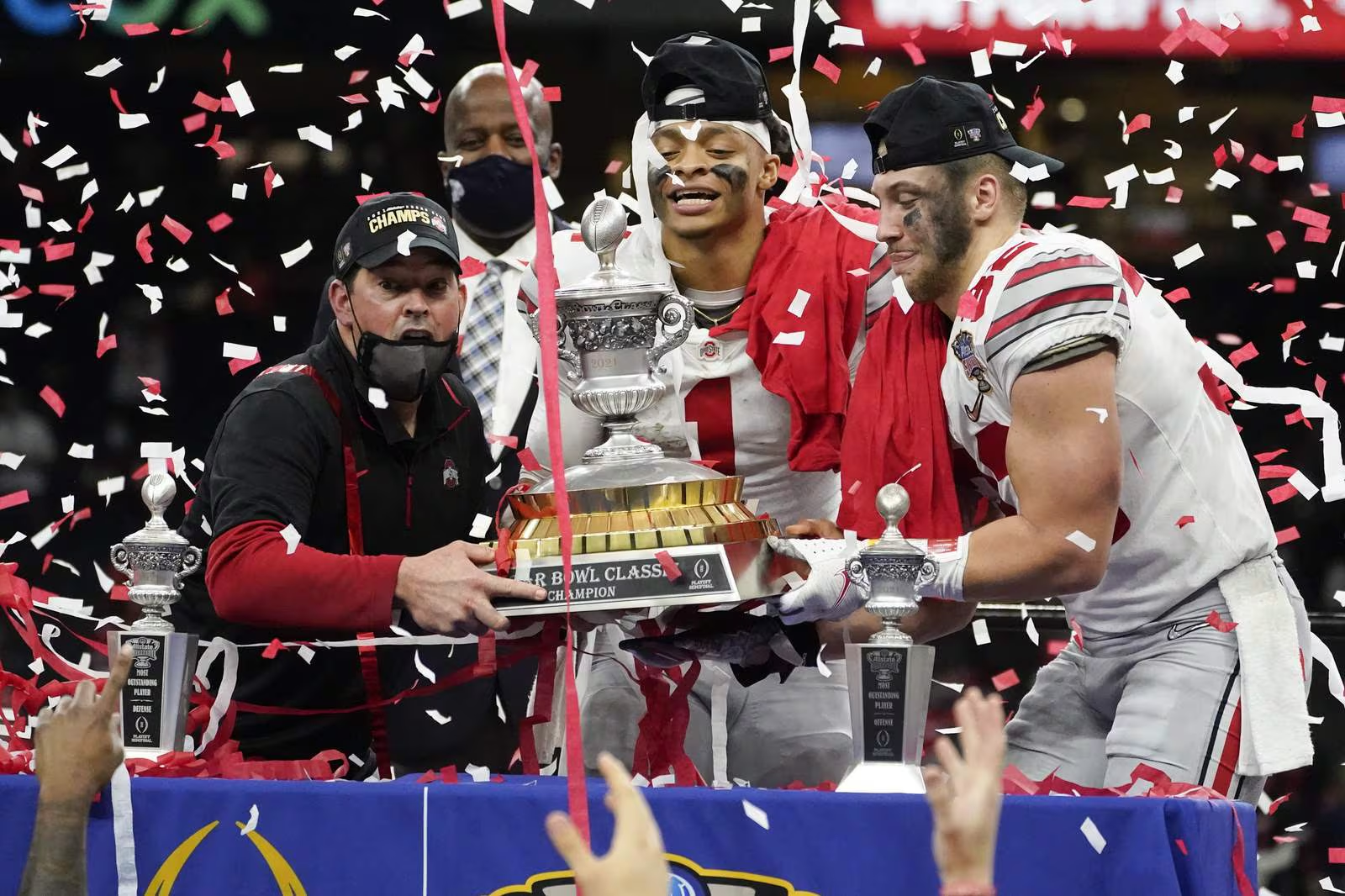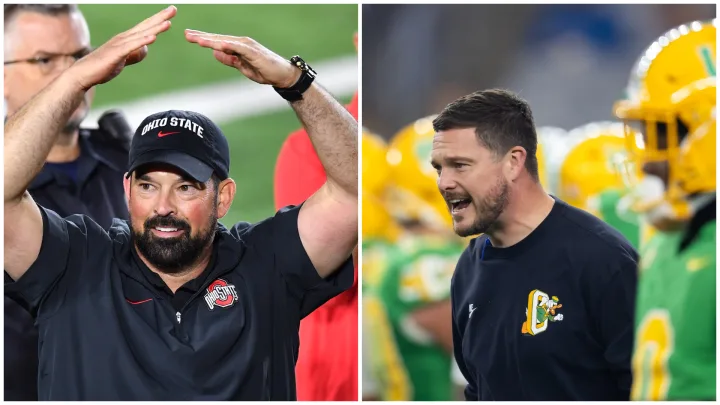
Ohio State Roasted for Celebrating Ryan Day’s Coach of the Year Semifinalist Honor
In the competitive world of college football, accolades and recognition for coaches often reflect not only the success of the team but also the perception of a program’s trajectory and its leadership. This year, Ohio State University’s head football coach, Ryan Day, was named a semifinalist for the prestigious Coach of the Year award. While this would typically be a cause for celebration within any program, Ohio State fans and critics alike found themselves embroiled in a significant debate over the appropriateness of the celebration. The school and its fans were roasted across social media and sports media outlets, with some questioning the validity of Day’s candidacy for such an honor given his recent performances, particularly in big games.
In this article, we will examine why Ohio State’s celebration of Ryan Day’s Coach of the Year semifinalist honor drew criticism, the challenges Day has faced as Ohio State’s head coach, and the broader implications of this situation within the context of college football. Ultimately, this incident highlights the high expectations that come with coaching a powerhouse program like Ohio State, as well as the tension between media accolades and real on-field performance.
Ryan Day’s Journey to Ohio State and Expectations
Ryan Day became the head coach of Ohio State in 2019 after Urban Meyer’s retirement. Meyer had built Ohio State into one of the most dominant programs in college football, with a storied history of success in the Big Ten and on the national stage. Day, a former offensive coordinator for the Buckeyes, stepped into the role with high expectations. His task was not just to maintain Ohio State’s prominence but to elevate it even further, bringing the program to new heights in a highly competitive landscape.
Under Day’s leadership, Ohio State quickly became a juggernaut offensively. The Buckeyes’ high-powered offense, led by quarterback Justin Fields, was one of the most dynamic in the nation. Ohio State’s success during the early years of Day’s tenure included a College Football Playoff (CFP) appearance in 2020 and multiple Big Ten championships. His ability to recruit top-tier talent, particularly on offense, and his offensive scheme, which was often lauded for its innovation, solidified Day’s reputation as a rising star in college football coaching.
However, despite his early success, Ryan Day has faced increasing pressure in recent seasons, especially when it comes to games against rival Michigan and in key matchups in the College Football Playoff. The high expectations of the Ohio State fanbase and media have made any perceived failure feel magnified. As the years have gone on, the question has shifted from whether Day could maintain Ohio State’s level of excellence to whether he could deliver a national championship and consistently win the big games that matter most.
The Semifinalist Honor: A Celebration or a Reminder?
In 2024, Ryan Day was named a semifinalist for the Coach of the Year award, an honor typically given to coaches who have exceeded expectations and led their teams to impressive achievements. At face value, being named a semifinalist for such an honor would be a significant achievement for any coach, particularly one leading a program like Ohio State. However, the public reception of this nomination was far from celebratory.
The reason for this mixed response lies in Ohio State’s overall performance in recent seasons. While the team has certainly been competitive, Day’s tenure has been marred by his inability to defeat Michigan in key matchups, most notably in the past two seasons. In addition, despite reaching the College Football Playoff in 2020 and coming close in other years, Ohio State has failed to secure a national championship under Day’s leadership. The Buckeyes have been an elite team in terms of regular-season success but have faltered at key moments, particularly in games against rival Michigan and in high-stakes playoff games.
The Buckeyes’ most recent loss to Michigan in 2023, which marked the third consecutive defeat in “The Game,” was a crushing blow to both the program and Day’s reputation. For a program with the level of tradition and expectations that Ohio State has, these losses are viewed as not just disappointing but unacceptable. Michigan, historically seen as Ohio State’s primary rival, has dominated the series in recent years under head coach Jim Harbaugh. The inability to overcome Michigan, combined with a failure to secure a national championship, led many to question the legitimacy of Day’s candidacy for Coach of the Year.
Social Media Backlash and Criticism
When Ohio State celebrated Ryan Day’s semifinalist honor, the response was swift and often scathing. The celebration, particularly the social media posts from Ohio State’s official channels, seemed out of place to many fans and critics, who felt that the timing of such an announcement was ill-advised. While the recognition of Day’s achievements was certainly deserved in some respects, many pointed out that his inability to win the big games, particularly against Michigan, overshadowed the accolade.
Critics flooded social media with memes, sarcastic comments, and pointed critiques. “Coach of the Year semifinalist, but can’t beat Michigan” became a popular phrase, capturing the frustration of Ohio State fans and outsiders alike. Many fans questioned the criteria for the Coach of the Year award, asking how a coach who had struggled in such crucial games could even be considered for such an honor. They argued that the award should be reserved for coaches who had demonstrated consistent success in the highest-profile games, and Day’s recent track record in those games was not reflective of that standard.
For Ohio State fans, this situation represents a deeper issue. The school’s football program is one of the most storied in college football history, and as such, expectations are sky-high. While Ryan Day has consistently fielded top-ranked teams, his inability to secure victories in key games has led to doubts about his future as the leader of the program. Ohio State fans are known for their passionate loyalty to the team, but that loyalty also comes with a demand for excellence on the field, particularly against rivals like Michigan. For many fans, celebrating a semifinalist honor for Coach of the Year felt tone-deaf when the ultimate goal – a national championship – had yet to be achieved under Day’s leadership.
The Bigger Picture: Is Ryan Day Underperforming?
The debate over Ryan Day’s Coach of the Year semifinalist honor is emblematic of a larger issue facing the Ohio State program. Day inherited a program that had been built to win championships under Urban Meyer, and as a result, he has faced enormous pressure to maintain that level of success. While Day has delivered in many areas, particularly in terms of recruiting and regular-season success, his inability to win the big games has left many questioning his ability to lead Ohio State to the promised land.
The losses to Michigan have been the most glaring example of Day’s shortcomings. Michigan had struggled in the rivalry for years, but under head coach Jim Harbaugh, the Wolverines have turned the tables in recent seasons. Michigan’s dominance in the rivalry, coupled with their recent success in the College Football Playoff, has made Day’s failures in these matchups all the more glaring. The inability to overcome Michigan has placed a dark cloud over his tenure at Ohio State, leading many to argue that his success in the regular season isn’t enough to justify his place among the game’s elite coaches.
Furthermore, while Ohio State has consistently made the College Football Playoff during Day’s tenure, they have not been able to capitalize on that success. In 2020, they made it to the national championship game but fell short against Alabama. In subsequent years, Ohio State has made the playoff but was unable to win the title. For a program of Ohio State’s stature, these near-misses are seen as failures, and they highlight the challenges Day has faced in managing expectations while competing at the highest level.
The Pressure of Being Ohio State’s Head Coach
Being the head coach at Ohio State comes with a unique set of challenges and expectations. The program’s rich history and passionate fanbase demand constant success and excellence. Anything short of a national championship is often viewed as a failure, particularly in a conference as competitive as the Big Ten. For Ryan Day, his success in the regular season and his ability to recruit top talent have been undeniable, but his struggles in the rivalry with Michigan and his inability to secure a national championship have clouded his tenure.
The celebration of his Coach of the Year semifinalist honor is a reminder of the fine line coaches at programs like Ohio State walk. While they are expected to win and compete at the highest level, they are also under constant scrutiny. For Day, the challenge is not just winning games but managing the high expectations that come with being the head coach of one of college football’s most storied programs.
Conclusion: Celebrating Accomplishments or Focusing on the Bigger Goal?
The controversy surrounding Ohio State’s celebration of Ryan Day’s Coach of the Year semifinalist honor underscores the complex nature of college football coaching. While Day has certainly had success at Ohio State, the expectation for championship-level performance is inescapable. His inability to win the big games, particularly against Michigan, has led to criticism, and many feel that his celebration of such an honor was premature given the program’s broader goals.
The discussion around Day’s Coach of the Year semifinalist honor highlights the tension between recognition and expectation. At Ohio State, where winning national championships is the ultimate goal, any accolade that doesn’t come with a championship feels secondary. For Ryan Day, the road ahead will require not just regular-season victories but success in the most important games of the year. Until he can achieve that, celebrations like the one surrounding his Coach of the Year semifinalist honor may continue to draw skepticism and even ridicule.




